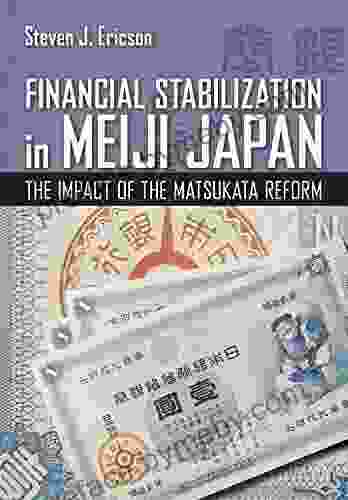Unveiling the Profound Impact of the Matsukata Reform: A Comprehensive Exploration


4.5 out of 5
| Language | : | English |
| File size | : | 4249 KB |
| Text-to-Speech | : | Enabled |
| Screen Reader | : | Supported |
| Enhanced typesetting | : | Enabled |
| Print length | : | 204 pages |
The Matsukata Reform, implemented in Japan during the Meiji Era (1868-1912),stands as a pivotal moment in the nation's economic and social development. This comprehensive article delves into the multifaceted impact of this transformative reform, drawing upon the insights presented in the acclaimed book, 'The Impact of the Matsukata Reform: Cornell Studies in Money.'
Economic Impact
The Matsukata Reform, spearheaded by Finance Minister Matsukata Masayoshi, aimed to address Japan's pressing economic challenges, including inflation, budget deficits, and a dependence on foreign loans. Matsukata implemented a series of bold measures, including:
- Tightening monetary policy: Raising interest rates and reducing the money supply to curb inflation.
- Fiscal austerity: Cutting government spending and increasing taxes to reduce budget deficits.
- Promoting industrialization: Encouraging the development of domestic industries through tariffs and subsidies.
These measures led to short-term economic contraction but laid the foundation for long-term stability and growth. Inflation was brought under control, budget deficits were reduced, and the domestic economy strengthened. Japan gradually transitioned from reliance on foreign loans to self-sufficiency.
Social Impact
The Matsukata Reform had significant social implications as well. The economic contraction associated with its implementation led to widespread hardship, particularly among the rural population. Many farmers were forced to sell their land or become tenant farmers, leading to increased social unrest and rural-urban migration.
However, the long-term benefits of the reform also brought about positive social changes. The development of domestic industries led to new employment opportunities in urban areas. The establishment of a modern banking system facilitated access to capital for businesses and individuals. These factors contributed to the gradual improvement of living standards and the emergence of a more prosperous middle class.
International Impact
The Matsukata Reform also had a profound impact on Japan's international standing. By stabilizing the economy and promoting industrialization, Japan asserted itself as a rising economic power. The reduction of foreign debt and the adoption of a gold standard enhanced Japan's creditworthiness and credibility in international markets.
The reform also played a role in shaping Japan's foreign policy. Matsukata's emphasis on fiscal discipline and economic self-reliance influenced Japan's approach to international relations. Japan became less reliant on Western powers and more assertive in pursuing its own strategic interests.
The Matsukata Reform was a transformative event that shaped the course of Japan's economic, social, and international development. While it brought about short-term challenges, its long-term impact laid the foundation for Japan's emergence as a modern industrial nation. The in-depth analysis provided in 'The Impact of the Matsukata Reform: Cornell Studies in Money' offers invaluable insights into this pivotal moment in Japanese history.
By studying the Matsukata Reform, we can gain a deeper understanding of the challenges and opportunities faced by nations undergoing economic transformation. It serves as a reminder of the power of bold economic policies and the importance of balancing short-term sacrifices with long-term prosperity.
4.5 out of 5
| Language | : | English |
| File size | : | 4249 KB |
| Text-to-Speech | : | Enabled |
| Screen Reader | : | Supported |
| Enhanced typesetting | : | Enabled |
| Print length | : | 204 pages |
Do you want to contribute by writing guest posts on this blog?
Please contact us and send us a resume of previous articles that you have written.
 Book
Book Novel
Novel Page
Page Chapter
Chapter Text
Text Story
Story Genre
Genre Reader
Reader Library
Library Paperback
Paperback E-book
E-book Magazine
Magazine Newspaper
Newspaper Paragraph
Paragraph Sentence
Sentence Bookmark
Bookmark Shelf
Shelf Glossary
Glossary Bibliography
Bibliography Foreword
Foreword Preface
Preface Synopsis
Synopsis Annotation
Annotation Footnote
Footnote Manuscript
Manuscript Scroll
Scroll Codex
Codex Tome
Tome Bestseller
Bestseller Classics
Classics Library card
Library card Narrative
Narrative Biography
Biography Autobiography
Autobiography Memoir
Memoir Reference
Reference Encyclopedia
Encyclopedia Steven M Barrett
Steven M Barrett Eric Engle
Eric Engle Dean Koontz
Dean Koontz Tom Givens
Tom Givens Elizabeth George Speare
Elizabeth George Speare Emily Journey
Emily Journey Timothy Pakron
Timothy Pakron Eugene C Toy
Eugene C Toy J R Rain
J R Rain Jessica J Lee
Jessica J Lee Enrique Desmond Arias
Enrique Desmond Arias Elmore Hammes
Elmore Hammes John Peck
John Peck Eliezer Yudkowsky
Eliezer Yudkowsky Elizabeth Ezra
Elizabeth Ezra Eldridge Cleaver
Eldridge Cleaver Ellen R Wald
Ellen R Wald Fernand Braudel
Fernand Braudel Georg Rauch
Georg Rauch Elizabeth Swire Falker
Elizabeth Swire Falker
Light bulbAdvertise smarter! Our strategic ad space ensures maximum exposure. Reserve your spot today!
 Craig BlairFollow ·11.4k
Craig BlairFollow ·11.4k Griffin MitchellFollow ·2.8k
Griffin MitchellFollow ·2.8k Ivan TurnerFollow ·4k
Ivan TurnerFollow ·4k John ParkerFollow ·16.1k
John ParkerFollow ·16.1k Anthony BurgessFollow ·10.5k
Anthony BurgessFollow ·10.5k Curtis StewartFollow ·11.6k
Curtis StewartFollow ·11.6k Harry CookFollow ·6.2k
Harry CookFollow ·6.2k Corbin PowellFollow ·12.9k
Corbin PowellFollow ·12.9k

 Richard Adams
Richard AdamsGame Development with Rust and WebAssembly: A...
Are you passionate...

 David Baldacci
David BaldacciGendered Identity and Aspiration on the Globalized Shop...
: The Convergence of Gender, Identity, and...

 Natsume Sōseki
Natsume SōsekiFresh Eyes On Panama: A Captivating Exploration of a...
Panama, a country often overshadowed by its...

 Adrian Ward
Adrian WardThe Life and Masterworks of J.M.W. Turner: A Timeless...
The Man Behind the Masterpieces ...
4.5 out of 5
| Language | : | English |
| File size | : | 4249 KB |
| Text-to-Speech | : | Enabled |
| Screen Reader | : | Supported |
| Enhanced typesetting | : | Enabled |
| Print length | : | 204 pages |
















